Bicycle Accidents
Boston’s Hubway Bike-Share Network Now Fully Launched for Year
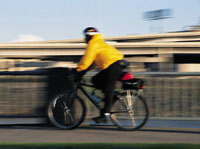 Boston’s Hubway bike-sharing system returned to full operation Sunday, when over 60 bike stations began offering rentals for the new season.
Boston’s Hubway bike-sharing system returned to full operation Sunday, when over 60 bike stations began offering rentals for the new season.
The New Balance Hubway had re-opened many stations for the spring on March 15. The program began last July, with 61 stations and 610 bicycles. It was widely used with over 140,000 rides logged between July 28 and November 30, when the program ended for the season. One highlight of the season was the program saw no serious bike crashes requiring ambulance response and only two bike accidents overall.
Boston Bikes, which manages the program, is making bike accident prevention and safety a top priority again this season. It has arranged with a number of local retailers to offer discounted bike helmets. Click here for a list.
The program is experimenting with new station locations this year, including the Boston Convention and Exhibition Center, Seaport Hotel and Cambridge Street in downtown Boston.
The Hubway offers $85 annual memberships or two types of casual memberships: $12 for three days or $5 for 24 hours. Rides less than 30 minutes are free with any membership. Longer rides range in prices. Annual members receive a 25 percent discount.
The program is operated by Alta Bicycle Share in partnership with Boston Bikes, an initiative of the City of Boston. It is partially funded by the Federal Transit Administration. Alta Bicycle Share of Portland, Oregon offers similar programs in Washington D.C. and Arlington, Virginia. It has been selected to manage Chicago’s first bicycle sharing program which will launch this summer.
In Boston, there are plans to expand the program into Roxbury, Dorchester, Jamaica Plain and Charlestown, Back Bay and downtown. Nearby, Cambridge, Somerville and Brookline plan to launch 30 stations this year.
Hubway users can find stations by visiting the Hubway website. The website provides a map of bike kiosks.
Related:
Hubway Bike Share Program Returns to Boston
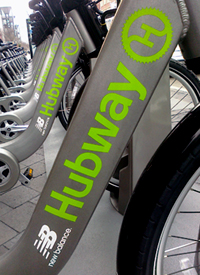 The New Balance Hubway bike sharing program re-launches in Boston tomorrow. Sixty percent of the stations will open, with the remainder scheduled to offer bike rentals by April 1.
The New Balance Hubway bike sharing program re-launches in Boston tomorrow. Sixty percent of the stations will open, with the remainder scheduled to offer bike rentals by April 1.
Hubway opened last July and had a busy first season with 3,650 cyclists signed up as annual members. The system, which is partially funded by the Federal Transit Administration, is operated by Alta Bike Share in partnership with Boston Bikes, an initiative of the City of Boston.
Cyclists can join as annual members for $85 per year or use the system as casual members and pay $12 for 3 days or $5 for 24 hours. The first 30 minutes of each ride is included in the cost, with riders paying for additional time based on their membership plan.
The schedule for opening bike rental stations could be delayed depending on weather conditions. Hubway recommends cyclists visit the Station Map page of its website to monitor progress, follow the program on Facebook or Twitter or download its free Spotcycle application to their smart phone.
The Boston bike accident lawyers at Breakstone, White & Gluck offer these safety tips for cyclists and drivers to avoid cycling accidents:
For Cyclists:
Wear a helmet. Protect yourself from sustaining injuries in bicycle accidents. Your purchase agreement with the Hubway program also requires it. Riders can purchase helmets when they register for the program. Helmets may also be available at some stations and the program has arranged for a number of local retailers to offer helmets at a discounted price of $7.99.
Cyclists should generally ride to the right of traffic, on the right side of the road. Bicyclists may also operate in bike lanes where available and in the center of the lane. Up to two bicyclists may travel abreast in the same lane. Cyclists are not permitted to ride on sidewalks in business districts and many areas of Boston.
Cyclists should never ride against traffic. They have to stop at red lights and stop signs just like motor vehicle traffic.
For Drivers:
Watch your speed! Drivers should travel at the speed limit or slower when conditions involving other vehicles, cyclists or pedestrians warrant it. Unless posted otherwise, state law requires drivers to travel at 30 mph in thickly settled or business districts and 40 mph outside of these areas.
Drivers should take caution turning to avoid bike accidents. Drivers who are turning left must yield the right of way to cyclists.
Drivers should look before they exit a parked car so as not to injure or impede the travel of a passing cyclist. This is illegal, can cause bicycle accidents and carries a fine of up to $100.
Drivers must have adequate room to pass a cyclist. They must also have enough space before returning back to the lane.
Related:
- Facts About Cycling in Massachusetts
- What to Know if You’ve Been Injured in a Bicycle Accident
- New Balance Hubway Program
- Bicyclists Can Protect Themselves By Buying Extra Car Insurance
- MassBike
Bicycle Accidents Can Be Prevented If Everybody Follows the Law
 Bicyclists have returned to the road in large numbers as Boston enjoys an unseasonably warm March. It is an optimal time for drivers to make sure they understand a bicyclist’s rights in Massachusetts and remind themselves to be vigilant when sharing the roadway. And for bicyclists, it is a good time to review the rules of the road.
Bicyclists have returned to the road in large numbers as Boston enjoys an unseasonably warm March. It is an optimal time for drivers to make sure they understand a bicyclist’s rights in Massachusetts and remind themselves to be vigilant when sharing the roadway. And for bicyclists, it is a good time to review the rules of the road.
As drivers, we often watch out for other cars, but fail to do the same for pedestrians, motorcycles or bicyclists. In some bike accidents, drivers do not even see a bicyclist until just before the collision, and sometimes not at all. Other times, we may not understand the laws or are not focused on the road.
What drivers should know about a cyclist’s rights in Massachusetts:
- Bicyclists are allowed to travel on the same roads as drivers (unless the road is a limited access highway) and must follow the same laws.
- Cyclists should generally ride on the right side of the road, but may use the full lane or the left lane when turning to the left, and cyclist may travel two abreast in the lane. They should not impede traffic.
- Many communities, such as Boston, Cambridge and Somerville, offer bike lanes or Shared Lane Markings (also known as Sharrows). Bicyclists are encouraged, but not required to use them.
- When drivers are turning left, they must yield right of way to any bicyclist.
- Cyclists are allowed to pass traffic on the right. Left turning motorists should be particularly aware at intersections where cyclists passing traffic on the right may be hidden from view.
- It is against the law for individuals to open a car door and interfere with the travel of a bicyclist. Drivers and passengers should turn and check for bicycle traffic before opening doors.
- Divers can only pass a cyclist if there is sufficient room. It is illegal to cut bicyclists off after passing. The driver must wait until there is enough room to move back into the lane to avoid causing a bike accident.
Of course, bicyclists must also follow the rules of the road. There are some laws that apply to bicyclists only. For example:
- Cyclists are required to use hand signals to indicate their intention to turn, except when doing so may cause a bicycle accident (for example, when both hands are needed for braking).
- Cyclists have to stop at red lights and stop signs. They cannot ride the wrong way on one-way streets. Bicyclists should ride in the same direction as traffic in their lane.
- Bicycles should be equipped with reflectors and a warning device, such as a bell, and if ridden after dusk or before dawn, must be equipped with appropriate lighting.
- Bicycles cannot be ridden on the sidewalk in a business district. Towns may have additional ordinances about where bicycles can and cannot be ridden.
Drivers and cyclists who have more questions can access information about Massachusetts bicycling laws and safety from MassBike. The Boston-based advocacy organization supports the development of bike-friendly infrastructure throughout the state and offers cycling education and safety programs.
Related:
- Facts About Cycling in Massachusetts
- What Every Massachusetts Cyclist Should Know About Car Insurance
Bicycle Accidents Rare in Boston Hubway Program, Officials Report
 Boston’s popular Hubway bike sharing program will expand into Cambridge and Somerville next spring, providing more opportunities for healthy, environmentally-friendly and fun travel.
Boston’s popular Hubway bike sharing program will expand into Cambridge and Somerville next spring, providing more opportunities for healthy, environmentally-friendly and fun travel.
Boston’s program, which began in July 2011, is scheduled to close its 60 bike rental stations and 600 bikes this week for the winter. Bikes are expected to be available again next March, weather permitting. At the same time, Cambridge plans to open 20 stations in areas such as Harvard, Central and Inman squares. Somerville plans to open 8 stations including in Porter, Union and Davis squares.
Brookline is also working on adding two Hubway stations at Coolidge Corner and Brookline Village.
Boston’s Hubway program had 3,650 annual members in its first season. The system is partly funded by a $3 million grant from the Federal Transit Administration. It is intended for short trips as an extension of public transit. Annual members who pay $85 per year and those with one-day $5 and three-day $12 memberships can take unlimited rides, but they must return bikes within 30 minutes to avoid incurring additional fees.
Among annual members, the average ride lasted 17 minutes.
As officials close up the Boston program for the winter, they report concerns over an increase in bicycle accidents never materialized. The program saw no serious bike crashes requiring ambulance response and only two bike accidents overall.
But one issue is less than half of Hubway cyclists appeared to wear bike helmets, the program reported. Nearly 75 percent of riders on other bikes wore helmets. The city of Boston has tried to boost bike helmet use by working with 30 bike shops to offer subsidized bike helmets for less than $10.
The Boston bike accident lawyers at Breakstone, White & Gluck urge cyclists to learn Massachusetts bicycle laws. Click here for our guide.
We also urge cyclists to consider purchasing bicycle accident injury protection through their automobile insurance policies. Check your uninsured and underinsured motorist coverage, which provides protection if there is a bicycle accident. This insurance is affordable and can ease the physical and financial recovery after a bicycle accident. Click to read our guide What Every Bicyclist Needs to Know About Car Insurance.
Click here to read an article in The Boston Globe about the Hubway bicycle sharing program.
Click here to learn more about Boston’s Hubway sharing program.
Read More
Cambridge Leads Massachusetts in Bike Accidents
 Cambridge and Somerville are known as bike-friendly communities, but new state figures show they are also among the most dangerous places for cyclists in Massachusetts.
Cambridge and Somerville are known as bike-friendly communities, but new state figures show they are also among the most dangerous places for cyclists in Massachusetts.
Cambridge saw 400 bicycle accidents involving cars from 2002 to 2009, according to The 2009 Top Crash Locations Report, which was recently released by the Massachusetts Department of Transportation. Over the past decade, the city had more bike-and-car crashes than any other community in Massachusetts, a recent Boston Herald review found.
Eight of the top 10 areas for bike crashes were in Cambridge. The state’s most dangerous bicycling intersection was Inman Square in Cambridge and Somerville. From 2002 to 2009, there were 106 bike accidents around Hampshire and Cambridge streets.
Other Cambridge areas included several sections of Massachusetts Avenue, including through Alewife Brook Parkway on the Arlington border. Porter Square – at Massachusetts and Somerville avenues – had the third highest number of bike crashes.
The state’s bicycling population is growing as infrastructure improvements continue and new bike share programs begin. Boston and Salem began bike share programs this summer, while Somerville is expected to launch its program next year.
With this growth and changes in Massachusetts bicycling laws in recent years, it is important for both drivers and cyclists to understand the law and follow it. Here the Boston bicycle accident lawyers at Breakstone, White & Gluck share some basic tips:
- Motorists are required to report accidents with bicyclists resulting in more than $1,000 in property damage or personal injury. It is a good practice to report all accidents in case pain and injuries arise later.
- Leaving the scene of an accident causing personal injury is a crime in Massachusetts punishable by up to two years in jail.
- Motorists are required to identify themselves and the owner of the vehicle to the cyclist, even when bike accidents are not reported to police.
- Bicyclists are required to report all accidents they are involved with that cause personal injury or $100 or more in damage.
- When a bicyclist is injured in a car accident, the driver’s auto insurance provides up to $8,000 in Personal Injury Protection benefits (also known as no fault benefits). These benefits cover medical expenses and lost wages, even if the driver was not negligent
- If you are a cyclist, you can protect yourself by purchasing coverage for accidents. Coverage can be purchased through your car insurance policy.
Additional Bicycle Resources
Facts About Cycling in Massachusetts
What Every Massachusetts Bicyclist Needs to Know About Car Insurance
What to Do When Car and Bike Collide. Boston Globe. Sept. 25, 2011.
Read More
Walmart Recall of 91,000 Defective Bicycles; Specialized Also Issues Bike Recall
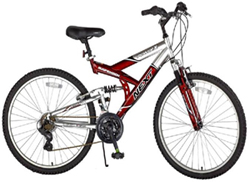 Anyone who has recently purchased a $100 bike at Walmart wants to pay attention to a bicycle recall issued this week.
Anyone who has recently purchased a $100 bike at Walmart wants to pay attention to a bicycle recall issued this week.
Bridgeway International of Naples, Florida has recalled 91,000 “NEXT”-branded men’s 26-inch hybrid bicycles. The products have a defective bicycle chain that can break and cause the bicyclist to lose control and fall in a bicycle accident.
The importer is aware of 11 reported incidents, including nine involving lacerations and other personal injuries.
The bicycles are red and orange and are marked “Power X” and “Suspension.” They were sold at Walmart from February 2011 through July 2011 for about $100. The model numbers are LBH2611M and LBH2611M2. The bicycles were manufactured in China.
Consumers are advised to stop using the recalled bicycles. They can contact the company for a free repair at 877-934-3228 or visit www.powerxbike.com for more information.
Defective Specialized Bicycle Recall. Separately, 14,200 bicycles with a defective brake component were recalled this week by Specialized Bicycle Components, Inc., a Morgan Hill, California distributor.
The bicycles have Advanced Group carbon forks and were manufactured by Advance Group, of Taiwan. The brake component housed within the bicycle’s carbon fork can disengage from the fork, allowing the brakes to contact the wheel spokes while rotating, posing a risk for falls and bicycle accidents.
There have been two reports of brake components disengaging from the carbon fork. No injuries have been reported.
The bikes were sold at authorized specialized retailers nationwide from June 2010 through August 2011 for $700 to $2,000. Consumers should stop riding these bicycles and return them to an authorized specialized retailer for a free repair or replacement. More information is available at 877-808-8154 or www.specialized.com.
Read More
Protecting Massachusetts Students Heading Back to School
 There is much to plan as students return to school each September. Buying new school supplies and clothes often makes the top of the to-do list, but even more important is planning how your child will travel to and from school safely.
There is much to plan as students return to school each September. Buying new school supplies and clothes often makes the top of the to-do list, but even more important is planning how your child will travel to and from school safely.
Approximately 17,000 children are sent to U.S. emergency rooms each year in school bus accidents, according to a 2006 report in the journal Pediatrics. Some 42 percent of student bus accident injuries and deaths result from crashes. But nearly 25 percent of school bus injuries occur during the everyday activity of boarding and stepping down from the bus.
There are many ways students travel to school: the school bus, parent car pools, walking and bicycling. All of these carry a risk for injuries and accidents – but this can be greatly reduced when drivers and students follow the rules of safety. Here the Boston personal injury lawyers at Breakstone, White & Gluck offer parents tips to keep their children safe:
Avoiding School Bus Accidents:
- Most Massachusetts school districts do not have seat belts on school buses, but if yours does, explain the importance of wearing one to your child.
- Instruct your child to wait until the bus is completely stopped before trying to board or exit.
- Tell your child to stand at least six feet back from the curb as the bus approaches.
- Explain to children they should never cross the street behind a bus because it may result in a pedestrian accident.
- Wait at the bus stop with young children. If you cannot do this every day, ask another parent to share the responsibility with you.
Avoiding Student Pedestrian Accidents:
- If possible, walk to school with your child. Arrange a neighborhood school walk and have parents take turns supervising.
- If your child is walking alone, explain that he or she must cross the street in the crosswalk under the supervision of a school crossing guard.
- Have your child wear bright colored clothing to avoid car accidents.
Avoiding Student Carpool Accidents:
- All children should wear seat belts. In Massachusetts, children ages five to seven or up to 4’9″ tall are required to travel in a child safety seat.
- Children under the age of 13 should ride in the back seat.
- Explain to children they should talk softly and let the driver concentrate on the road.
Avoiding Student Bicycle Accidents:
- In Massachusetts, children and teens age 16 and under are required to wear bike helmets.
- Do not allow young children to bicycle to school.
- Make sure your child has the appropriate experience on a bicycle and is familiar with traveling the route to school.
- Teach children to ride in the same direction as traffic on the right side of the road.
- Children and teens bicycling to school should wear bright colored clothing.
Cambridge and Somerville Ranked Among Top U.S. Cycling Cities
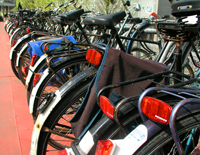 Local cyclists have long known Cambridge and Somerville offer some of the best riding in Greater Boston. But a popular website now says they are among the foremost biking destinations in the nation.
Local cyclists have long known Cambridge and Somerville offer some of the best riding in Greater Boston. But a popular website now says they are among the foremost biking destinations in the nation.
The Street.com recently released its 10 Best U.S. Bike Cities of 2011 list, naming Cambridge the fifth best bicycling city and Somerville the ninth. Boulder, Colorado was the leader.
Cambridge was praised for the strong network of bicycle lanes and shared lane space along the Massachusetts institute of Technology (MIT) campus and nearby technology companies, such as Genzyme, Sanofi Aventies, Biogen Idec and Akamai.
Cambridge bicyclists make up 8.5 percent of the city’s population. The city has several bike shops. Cambridge Police are active in educating the public about taking steps to prevent bicycle accidents. The Cambridge Bicycle Committee has been working to improve safety conditions and reduce bike accidents since 1991.
Somerville was recognized for its bicycling infrastructure and the strong community support for bicyclists. Some 5 percent of the city’s residents are cyclists. Many riders are college students, who account for 16 percent of the population. The city neighbors Medford, home to Tufts University, and Cambridge, where Harvard University, MIT, Leslie University and Cambridge College are all based.
Somerville was praised for its “walkable, accessible squares,” and bicycle-friendly businesses, which offer Tour de France specials, bicycle valet services and benefits for local bike groups. Businesses also host an annual bike party that shuts down a portion of Davis Square.
Somerville has several bike shops and formed the Somerville Bicycle Committee in 2001. The committee has overseen development of new bike lanes, sharrows and multi-use paths to prevent bicycling accidents and personal injuries. It has also guided the development of on-street bike parking in corrals and the ongoing installation of bike racks.
To read the 10 Best U.S. Bike Cities of 2011 report, click here.
Click here to learn more about Massachusetts bicycling laws.
Read More
Boston Welcomes New Bike Share Program
Boston has a new bicycle sharing program, implemented on July 28th, and it is off to a great start. The program, which is known as Hubway, stations bicycles throughout the city at terminals. You can rent a bike for a short period of time, or become a member and have a year of privileges.
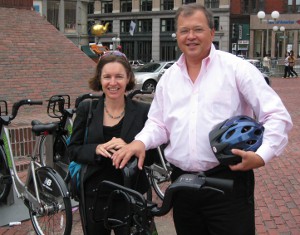
Hubway is another step in making Boston a bicycle-friendly city. The city, under the inspiration of Mayor Menino and with the guidance of Olympic cyclist and Bicycle Program Director Nicole Freedman (shown at right with David White, at the Government Center Hubway Station), has expanded its bicycle lanes and its bicycle parking, and it now has added convenient bicycle rentals.
Hubway deploys 600 bicycles at around fifty stations around the city. A bike can be picked up at one station and parked at another, making the program convenient for commuters, students, and tourists. There is even an phone application called Spotcyle which gives up-to-the-minute data on which terminals have bikes or available parking docks.
David White, one of the attorneys at Breakstone, White & Gluck, called these efforts “great steps to making Boston a safer place to ride your bicycle.” The program will also reduce pollution and promote fitness.
White explained, “Cycling becomes much safer as motorists become more aware of bicycles sharing the roadways. Populating the city with hundreds more bicycles will actually increase safety for all bicyclists.”
Hubway also promotes safe cycling by urging cyclists to always wear a bicycle helmet, and to always observe traffic laws, which apply equally to bicyclists.
White urges Boston cyclists to observe Massachusetts bicycle laws (read more here). He also urges cyclists to check their automobile insurance policies to make sure they have adequate uninsured and underinsured motorist coverage, which provides protection if there is a bicycle accident (read more here).
Congratulations to the City of Boston and Hubway!
Youth Bicycle Helmets Recalled
 Parents are advised to check their children’s bicycle helmets after a widespread recall involving popular models sold at Walmart and Amazon.com. The recall may affect families and cyclists in Massachusetts.
Parents are advised to check their children’s bicycle helmets after a widespread recall involving popular models sold at Walmart and Amazon.com. The recall may affect families and cyclists in Massachusetts.
Bell Sports of Scotts Valley, California is recalling 33,600 of its Bell Exodus full-face helmets with a plastic buckle on the chinstrap. The defective bike helmets have an angled visor and came in multiple colors in youth size. They were sold at Walmart stores and Amazon.com for $50 to $60 between August 2009 and March 2011.
The helmets pose a head injury hazard in the event of bike accident. The plastic buckle that connects the chin straps can fail and cause the helmet to fall off the person’s head, leaving them unprotected in bicycle accidents. The company has received one report of a buckle failing, resulting in a personal injury that required facial stitches.
Some 31,100 of the defective bike helmets were sold across Massachusetts and the United States. Another 2,500 helmets were sold in Canada.
Consumers are advised to stop using the helmets immediately. Read about the bike helmet recall on the Consumer Reports website. You will find a list of model numbers.
Contact Bell Sports if you have a defective helmet and request a free replacement. Call Bell Sports toll-free at 866-892-6059 between 8 a.m. and 5 p.m. CT Monday through Friday.
If you are a cyclist, wearing a helmet is critical to reducing the risk of head injuries. It is also critical for your children. It is important to purchase a helmet which is safe for use, meets CPSC standards and to learn how to properly fit your helmet. To learn more, read this brochure from the NHTSA – and share it with your friends and family members who ride.
Another important safety tip is to replace your helmet regularly. We hope you never fall or are injured in a bicycle crash, but if you do fall, your helmet should be able to absorb the fall and provide protection. Once a helmet hits the ground in a crash, it should be replaced right away. If you don’t crash, you maybe able to use your helmet for a few years. You have to carefully inspect your helmet, evaluate the condition of the helmet and the wear and tear on helmet straps. Some people should replace helmets every year and others may work for two or three years.
In Massachusetts, cyclists who are 16 and younger are required by law to wear bicycle helmets. Bike share programs in the Boston area typically have language in their rider contracts, requiring cyclists to wear helmets at all times. Wearing a bicycle helmet is a step every cyclist can take to protect themselves, so we hope you and your family take time to purchase helmets and commit to wearing them. Read More

